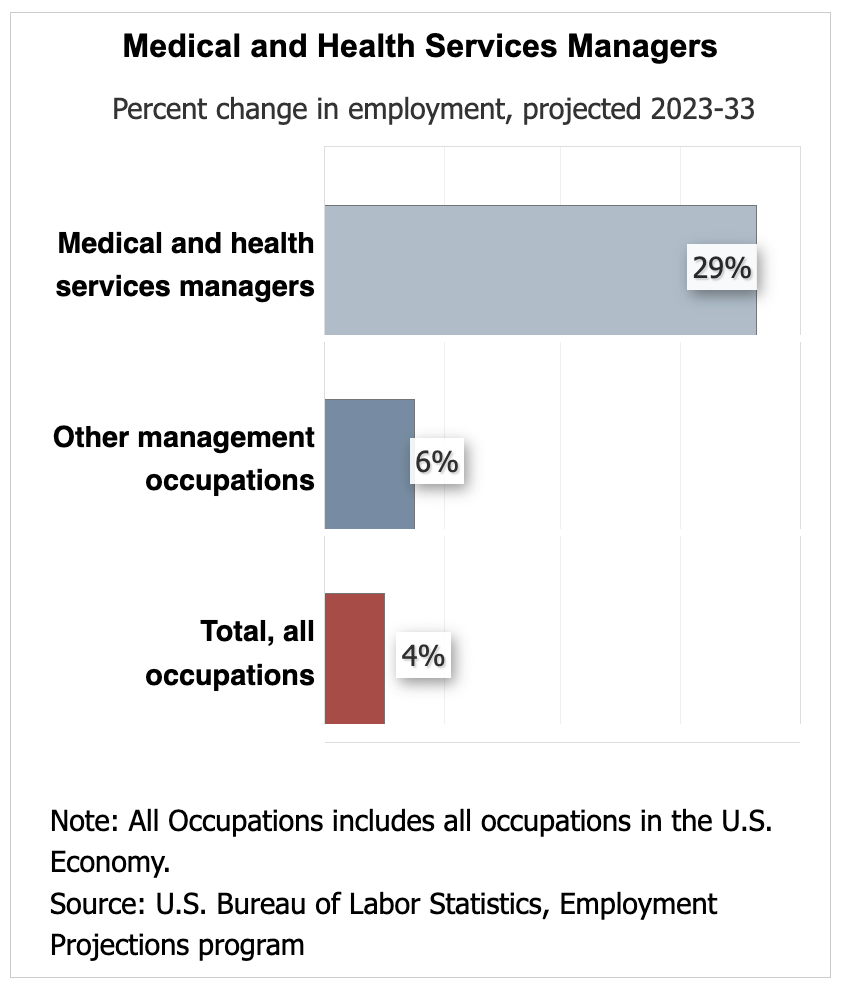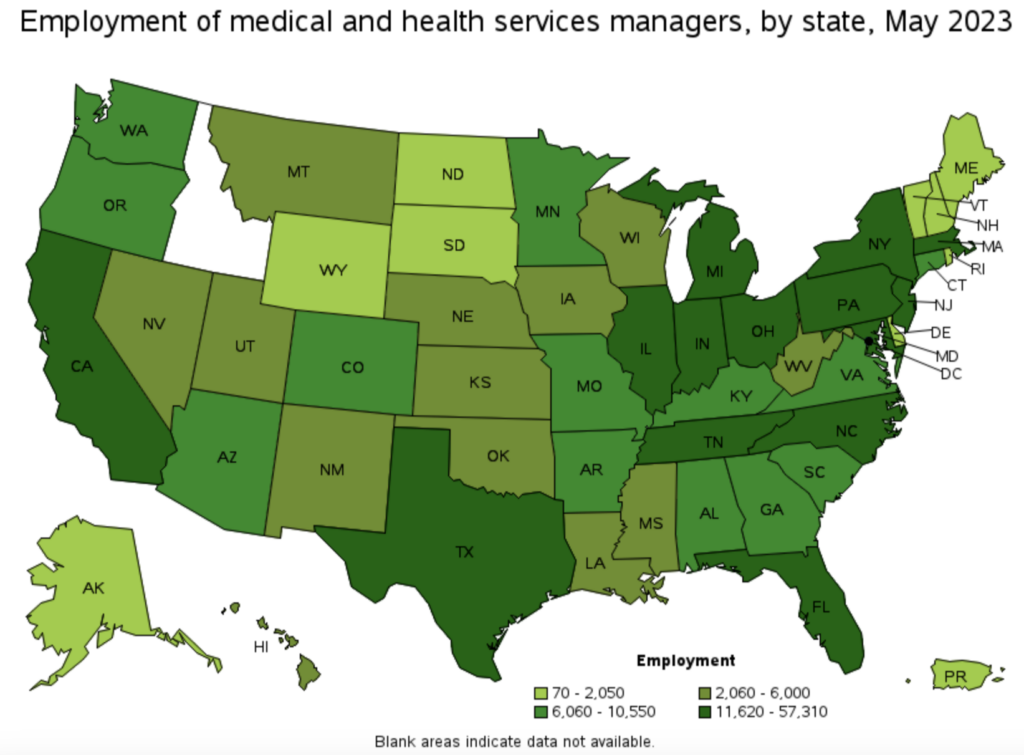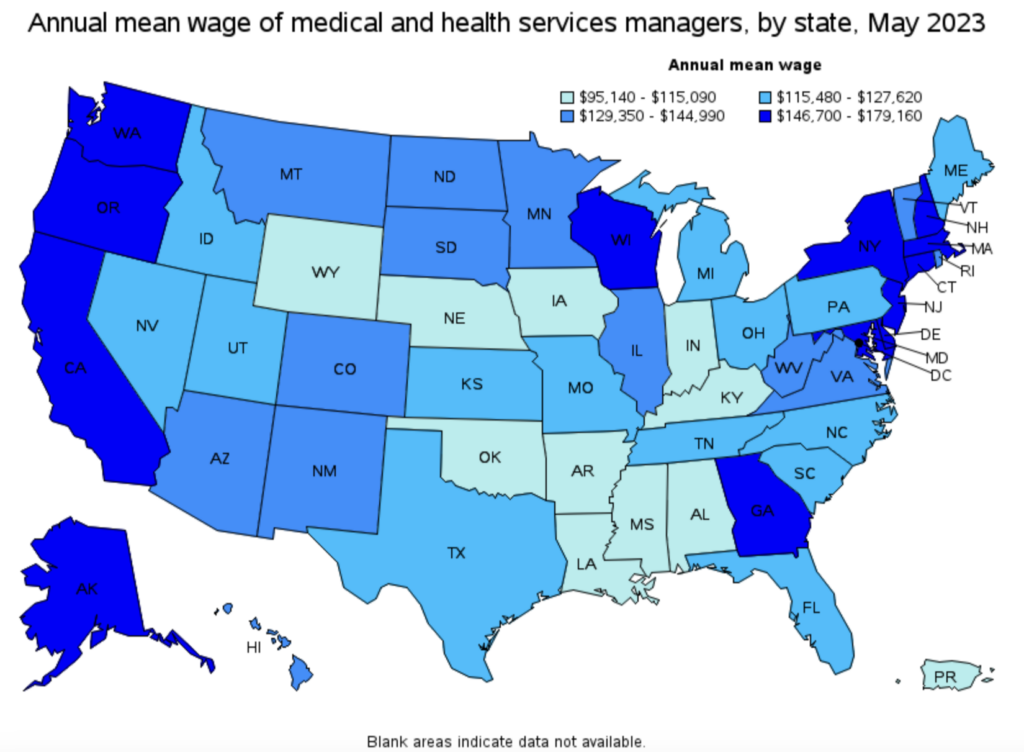Choosing a career in healthcare administration can lead to opportunity, growth, and flexibility.
According to the US Bureau of Labor Statistics, employment of medical and health services managers is projected to grow 29 percent from 2023 to 2033, much faster than the average for other management occupations. It’s also a career path that consistently ranks high in terms of wage potential, job stability, and growth.

- U.S. News & World Report ranked medical and health services manager #2 on their list of Best Business Jobs and #6 on their 2024 list of 100 Best Jobs, citing healthcare administration’s opportunities for advancement and above average salaries.
- Key drivers behind the growth in healthcare administration careers include high demand for healthcare services and an aging “baby boomer” population. Advances in technology that help manage medical records and deliver patient care are also a factor.
- Medical and health services managers encompass a range of occupations within the practice of healthcare management, offering flexibility based on location, healthcare setting, workplace, and the size of an organization.
What does a healthcare administrator do?
Essentially, it’s an administrative job tasked with the business of running a healthcare organization, with responsibilities similar to other management occupations. However, a healthcare administrator typically needs to understand healthcare systems, health law and policy, operational issues unique to healthcare settings, patient care management, and the complexities of supporting high-performance work teams. Prior experience working in healthcare, in either management or clinical roles, can be a significant advantage.
A healthcare administrator may lead a complex healthcare system with a large workforce, manage a small, private practice, or oversee a clinical area or department within a hospital, nursing home, assisted living facility, or clinic. While you may not work directly with patients, you’ll contribute to delivering quality healthcare services. As a healthcare administrator, you can have a significant impact on your organization, its employees, and the patients receiving care.
A healthcare administrator may be tasked with:
- Financial management, such as managing budgets, financial reporting, billing processes, and capital investment decisions.
- Human resource strategies and workforce development, including policies that promote employee well-being in the workplace.
- Quality and performance improvement, such as changes to the patient experience or workplace efficiencies to improve the quality of healthcare services.
- Ensuring the organization is in compliance with state and federal law.
- Public relations, communications, and marketing.
- Setting policy on information governance, including management of electronic health records, health IT, and privacy.
- Strategic planning to ensure operational success.
- Some healthcare managers may also represent their organization or department to the hospital board of directors.
Healthcare administrators play a vital role in their healthcare organization, ensuring it is operating effectively and profitably, supporting the work of clinical staff, and providing the best possible care to patients.
Healthcare Administration Skills
Specific skills a healthcare administrator needs vary by position. The top skills employers seek include strategic planning, quality and performance improvement, care coordination, medical records, billing, auditing, workflow management, managed care, and nursing. Employers also look for candidates who demonstrate skills in leadership, operations, communications, customer service, problem solving, and knowledge of federal and state healthcare law and policy, including Medicare and Medicaid. Demand for administrators with experience in electronic medical records, clinic management systems, and Epic EMR continues to grow, demonstrating the increasing use of technology in managing patient care.
The case for communication
 Medical and health services managers work with administrative staff such as office staff, medical records technicians, and others, clinicians that provide patient care such as physicians, surgeons, registered nurses, and clinical support staff. They may work with different levels of management depending on the structure of the organization including a board of directors, CEO, C-suite executives such as CFO, CIO, and COO, chief medical officer, chief nursing officer, and other administrative managers across different healthcare teams.
Medical and health services managers work with administrative staff such as office staff, medical records technicians, and others, clinicians that provide patient care such as physicians, surgeons, registered nurses, and clinical support staff. They may work with different levels of management depending on the structure of the organization including a board of directors, CEO, C-suite executives such as CFO, CIO, and COO, chief medical officer, chief nursing officer, and other administrative managers across different healthcare teams.
Because healthcare administration often involves conflict management and strategic collaboration across multiple healthcare disciplines, effective communication and other soft skills are important, such as:
- Active listening
- Empathy
- Conflict resolution
- Integrity
- Patience
- Critical thinking
- Analytic reasoning
- Decision-making
- Time management
Unlike hard skills, which are job specific, soft skills characterize personal attributes and determine how an individual interacts in their relationships with others. A professional with strong soft skills excels in communication, conflict resolution, motivation, and is able to facilitate understanding across a diverse workforce. Soft skills are valued in healthcare because they allow for better success in team settings and create stronger relationships, which can positively impact patient care and outcomes.
Get Program Guide
Learn more about our 100% online degree and certificate programs.
Healthcare Administration Careers and Salaries
A healthcare administration salary depends on several factors, including the workplace, size of the organization, job title, region, education, and experience. Additional factors, such as benefits, profit sharing, retirement, and bonuses, can also impact total compensation.
Workplace
A wide range of healthcare administration job opportunities exist in nearly every healthcare setting—hospitals, physician’s offices, surgical centers, assisted living and skilled nursing facilities, insurance companies, veterans affairs systems, pharmaceutical companies, and medical supply vendors. The highest levels of employment can typically be found in general medical and surgical hospitals.
Size of healthcare organizations also vary and this can be a factor in salary. An executive administrator overseeing a large hospital or health system with many hospitals and outpatient care centers may earn a higher salary compared to an administrator of a smaller, non-profit community health clinic.
Hospital Administration
 A hospital may be the first workplace that comes to mind when thinking of opportunities in healthcare administration. According to the American Hospital Association, there are more than 6,000 hospitals across the US, including community hospitals in both urban centers and rural areas. Two-thirds of community hospitals are affiliated with a healthcare system.
A hospital may be the first workplace that comes to mind when thinking of opportunities in healthcare administration. According to the American Hospital Association, there are more than 6,000 hospitals across the US, including community hospitals in both urban centers and rural areas. Two-thirds of community hospitals are affiliated with a healthcare system.
The median hospital administrator salary is $95,466 per year (Payscale.com), however, actual salary will vary based on location, experience level, and employer. An experienced hospital administrator may earn the median medical and health services manager salary of $110,680 per year or higher.
Private Practice Administration
While the physician-owned private practice is giving way to larger practices affiliated with a hospital or health system, nearly half (46.7 percent) of patient care physicians worked in a private practice in 2022, according to a recent benchmark survey published by the American Medical Association. Advantages of a private practice include more autonomy in decision-making compared to a large hospital or health system, a smaller workforce, and possibly a closer relationship with the patients served and the community in which the practice operates. Private practices can be found in both urban and rural areas.
Depending on the location and size of the practice, a practice administrator salary ranges from $56,000 to $119,000 per year, with a median salary at $79,747 per year (Payscale.com). An experienced administrator may earn an annual salary closer to the higher end of the range.
Assisted Living and Nursing Home Administration
According to the American Health Care Association/National Center for Assisted Living, there are 15,655 skilled nursing care centers in the US, serving 3.9 million people for short and long-term stays, and 30,600 assisted living communities in the US, providing residential services to those who need help with some activities of daily living (ADLs) but not around-the-clock care.
An aging population seeking different care models than previous generations combined with often complex regulatory oversight continues to drive demand for skilled professionals with knowledge of generational dynamics; ethical, legal and regulatory factors relevant to these types of healthcare organizations; strong financial, leadership, and management skills; and human resource strategies.
The long-term care (LTC) continuum offers a variety of opportunities in memory care, adult day care centers, home healthcare, continuing care retirement communities, assisted living and skilled nursing facilities, hospice, and related healthcare settings.
Average annual salary for a nursing home administrator in Wisconsin, according to Glassdoor, is $121,000 per year. All states require licensure for nursing home administrators, and some states also require licensure for administrators in assisted living facilities. The average salary for an assisted living administrator is $65,723 per year (Payscale.com).
Job Title
The salary a healthcare administrator will earn varies by job title, which may indicate whether a position is entry level, mid career, or part of senior or executive leadership. Jobs requiring years of experience, for example, senior leadership and CEO positions, typically earn a higher salary along with having greater accountability for the success of the organization. A healthcare administrator may oversee an entire health system or a specific department, or may specialize in a practice area, such as director of nursing, chief medical officer, etc.
Sample of reported job titles (from O-Net Online): Cancer Center Director, Clinical Director, Health Information Management Director (HIM Director), Health Information Manager (HIM Manager), Healthcare System Director, Medical Records Director, Medical Records Manager, Mental Health Program Manager, Nurse Manager, Nursing Director.
Region
Job opportunities in healthcare administration exist across the US, in urban, suburban, and rural areas, however, location can be a major factor when determining salary.

States with the highest level of employment of medical and health services managers:
- California
- Texas
- Florida
- New York
- Pennsylvania
Typically, states with densely populated urban and suburban metropolitan areas will offer the highest concentration of employment opportunities and competitive salaries. However, some rural areas with a lower concentration of healthcare organizations and fewer employment opportunities offer salaries competitive with healthcare organizations in top-paying metropolitan areas.

For example, North Dakota has comparatively fewer medical and health services managers than states with the highest employment, but the annual mean wage ($132,940) is competitive with wages in metropolitan areas such as Chicago, Dallas-Fort Worth, and Miami-Fort Lauderdale. It’s important to remember, however, that even in states with lower annual mean wages, pay for healthcare administrators is generally favorable in comparison to the cost of living.
Top paying states for medical and health services managers:
- New York
- District of Columbia
- Delaware
- New Jersey
- Massachusetts
Education and Experience
A quick scan of healthcare administrator job listings shows employers are looking for candidates with demonstrated skills and knowledge in healthcare administration acquired through a combination of education and work experience.
According to the BLS, medical and health services managers typically will have earned at least a bachelor’s degree, but employers increasingly prefer candidates who have earned a master’s degree, especially for executive roles that require greater understanding of the complexities of healthcare systems, communication skills, and strategic leadership. With a master’s degree in healthcare administration, employment opportunities increase along with lifetime salary potential.
Your Next Career Move—Healthcare Administration
As a graduate of the online UW Master of Science in Healthcare Administration, you’ll be qualified for leadership roles in a variety of healthcare settings, urban to rural. Enrollment advisers can help with all of your program questions. Call 608-800-6762 or email learn@uwex.wisconsin.edu.









